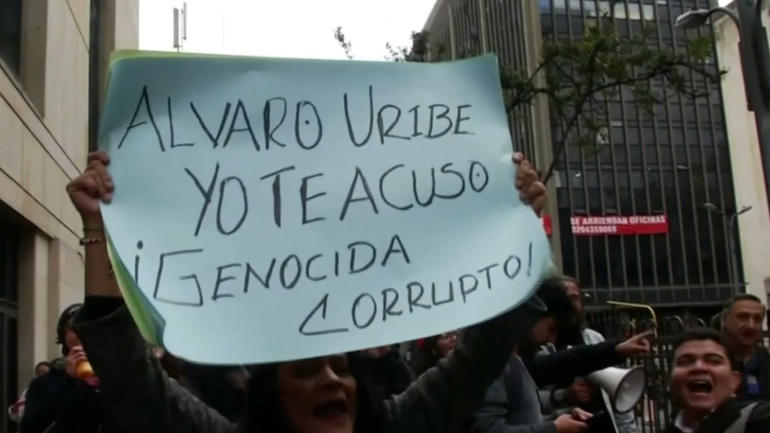On Tuesday, former Colombian President Alvaro Uribe Velez appeared in front of the country’s Supreme Court. Now a senator, he faces criminal charges for witness tampering. Some also accuse him of forming death squads in the 1990s.
CGTN’s Michelle Begue reports.
As Uribe arrived at the hearing, chaos erupted as opposers heckled him. “Uribe you are a fascist and terrorist,” they shouted. Santiago Archila, a student leader said, “We believe in his mission to defend our liberty our democracy and defend this country from terrorism. And we are convinced of his honorability and that he has fought with love for Colombia.”
The trial has been closed to the public, calling a total of around 48 witnesses to the stand. The investigation centers on claims that Uribe formed the far-right, Medellin-based paramilitary group called Bloque Metro.
Uribe is accused of bribing witnesses to testify they fabricated accusations for a smear campaign led by left-wing politician Iván Cepeda.
Director of Political Science at the Javeriana University, Andres Davila said this could have far-reaching implications for the country as the former president is the leader of his party and political patron of Colombian President Ivan Duque. “Most likely whatever happens in the coming week will have an impact in the country’s regional elections on October 27,” added Davila.
Davila said with this uncertainty Colombia joins the political disorder, destabilizing the rest of Latin America. Davila explained, “A Venezuela with two presidents for the last 6 months, a Peru that last week closed its congress, and Ecuador where the capital has been transferred to the second-largest city. So the region is in the middle of an upset.”
Uribe sat in court, his supporters took to the streets across the country. In Bogota’s national park, these Colombian citizens insisted on Uribe’s innocence.
While it is unclear how long this trial will drag on, Uribe could go to jail if found guilty. Davila said, “In Latin America we have had a history of presidents that have been tried and condemned. Brazil is a particularly strong case for that. And while Colombia had been immune to that, now we are living a similar case, all though with its particular differences.”
 CGTN America
CGTN America

